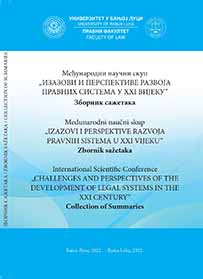SISTEM PRAVNE EKSPERTIZE KAO OKVIR FUNKCIONALNE POVEZANOSTI PRAVA I PROGRAMIRANJA
THE SYSTEM OF LEGAL EXPERTISE AS A FRAMEWORK FOR THE FUNCTIONAL NEXUS OF LAW AND PROGRAMMING
Author(s): Predrag CvetkovićSubject(s): Law, Constitution, Jurisprudence, Civil Law, International Law, ICT Information and Communications Technologies
Published by: Правни факултет Универзитета у Бањој Луци
Keywords: Law as code; Law and Programming; Algorithmization of law; Legal Expert System; Specification of the legal process; proposal of the EU Regulation on artificial intelligence;
Summary/Abstract: The paper deals with the issue of the “Legal Expert System”-LES as a framework for integration of law and programming. The reason for the existence of LES is the similarity of law and programming languages with regard to the structure of reasoning based on premises and conclusions, and the defined process and format of implementing the conclusions arrived at as the result of such a reasoning. The similarities described are a means of overcoming the key difference between legal prose and programming code: a programming language follows strict programming rules, whereas the language of legal prose is based on linguistic principles of natural language in the function of formulating a legal rule. The system of legal expertise should provide a two-dimensional analysis of the involved issues (legal and programming ones). The condition for programming the line of code, including the programming of legal norm as well, is the specification of the object of programming: converting a legal norm into a program code requires the specification of parts of the norm and its possible specifications. The paper presents the twofold systematization of types of specification: process-oriented and result oriented specifications. Obstacles to an adequate specification are the difference in syntax of legal formulations and program code, including inconsistency and ambiguity of legal rules. The method of evaluating the identity of the equality of the program code and the code-embedded specifications differs depending on whether it is a result-based or a process-based specification. The paper illustrates the influence of the functioning of the LES system on the formulation of legal rules that are the object of programming.
Journal: Зборник радова Међународни научни скуп „Изазови и перспективе развоја правних система у XXI вијеку"
- Issue Year: 2022
- Issue No: 2
- Page Range: 147-157
- Page Count: 11
- Language: Serbian

